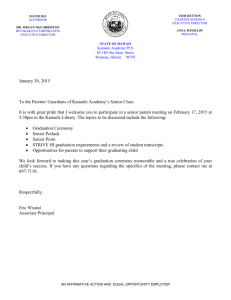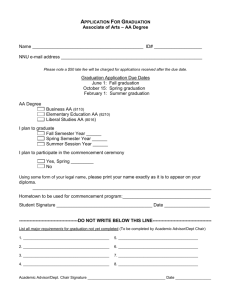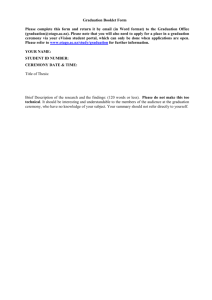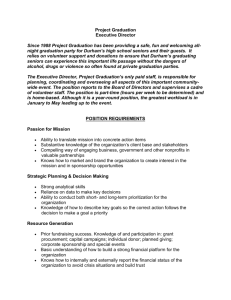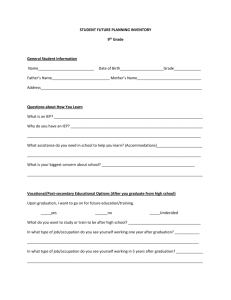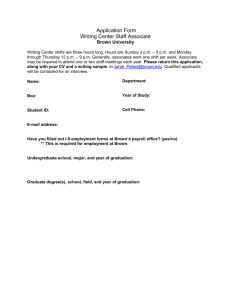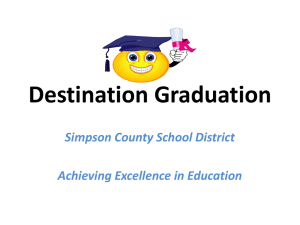APL 2015
advertisement
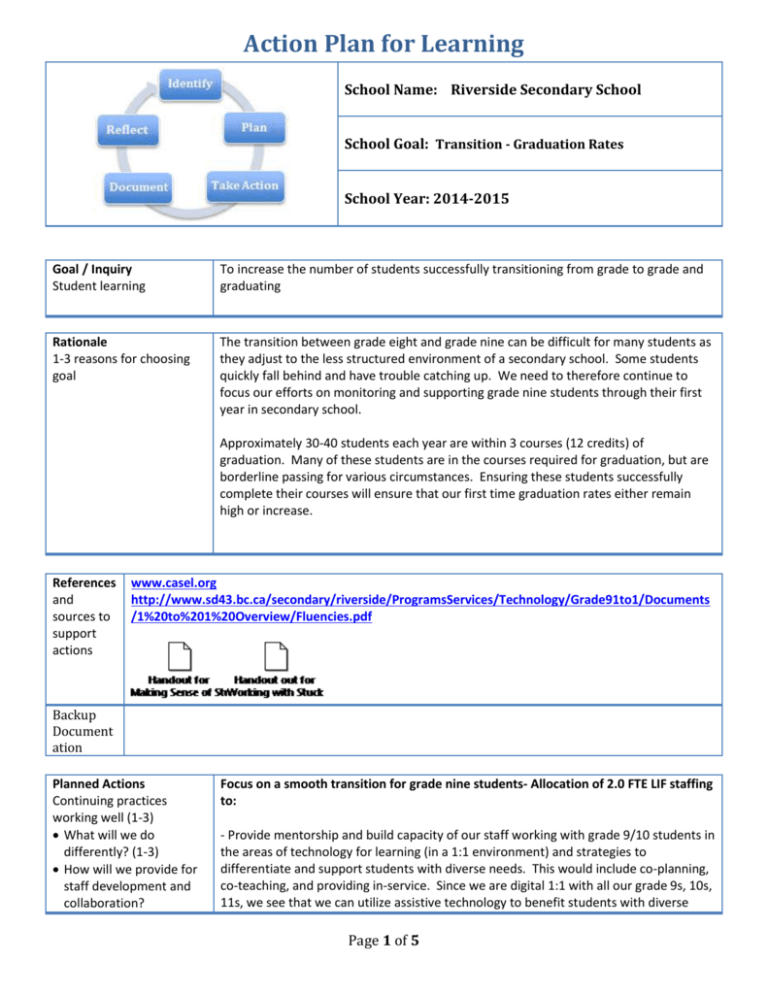
Action Plan for Learning School Name: Riverside Secondary School School Goal: Transition - Graduation Rates School Year: 2014-2015 Goal / Inquiry Student learning To increase the number of students successfully transitioning from grade to grade and graduating Rationale 1-3 reasons for choosing goal The transition between grade eight and grade nine can be difficult for many students as they adjust to the less structured environment of a secondary school. Some students quickly fall behind and have trouble catching up. We need to therefore continue to focus our efforts on monitoring and supporting grade nine students through their first year in secondary school. Approximately 30-40 students each year are within 3 courses (12 credits) of graduation. Many of these students are in the courses required for graduation, but are borderline passing for various circumstances. Ensuring these students successfully complete their courses will ensure that our first time graduation rates either remain high or increase. References and sources to support actions www.casel.org http://www.sd43.bc.ca/secondary/riverside/ProgramsServices/Technology/Grade91to1/Documents /1%20to%201%20Overview/Fluencies.pdf Backup Document ation Planned Actions Continuing practices working well (1-3) What will we do differently? (1-3) How will we provide for staff development and collaboration? Focus on a smooth transition for grade nine students- Allocation of 2.0 FTE LIF staffing to: - Provide mentorship and build capacity of our staff working with grade 9/10 students in the areas of technology for learning (in a 1:1 environment) and strategies to differentiate and support students with diverse needs. This would include co-planning, co-teaching, and providing in-service. Since we are digital 1:1 with all our grade 9s, 10s, 11s, we see that we can utilize assistive technology to benefit students with diverse Page 1 of 5 How will we involve parents? How will we involve students? How will we monitor progress and adjust actions? needs. Furthermore, we intend to work with staff to use Edublogs as a tool for showcasing and communicating student learning over time. -Build capacity with staff in the areas of Mental Health/Social and Emotional Learning, particularly with respect to Relationships, Care, Culture, Compassion, and Sense of Belonging. Staff capacity is being built through in-service with Miriam Miller and Colleen Drobot. A learning team has been created to begin gathering data around the above 5 key areas. - Work collaboratively with the Math 9 teachers to provide an inclusive learning environment that supports students being articulated from middle school as being well below grade level. How will we involve parents? Regular updates at PAC and SPC meetings Continued involvement in Southside Family of Schools initiatives More frequent parent information evenings on specific topics of interest to parents Communication on relevant topics via newsletters, blog, and web-site How will we involve students? Utilize student leaders to assist with transitioning (orientation, intramurals, technology support, peer tutoring) Survey students to gather more specific data on connection to the school, pride, involvement, inclusion, and relationships. Involve students in the analysis of data and development of actions that may enhance grade to grade transition with respect to the areas of relationships, care, culture, compassion, and sense of belonging Create a student working group as part of the learning team to bring forward a student perspective in the above areas and to assist with developing an action plan to support those areas. How will we monitor progress and adjust actions: More frequent examination of report card and provincial exam data on school and department levels Counsellors and student services will continue to monitor students at risk as the year progresses. Counsellors will continue to review each grade 12 program to make sure they are meeting graduation requirements. Furthermore, any grade 12s who are eligible for graduation, but at risk of not graduating due to lower than passing marks, will be placed on a plan of assistance with counsellors, teachers, and administrators. Teachers will review student success on a regular basis to make sure students receive the support they may need. Report card and exam data will be reviewed by school leaders with their departments to look for groups that may need additional support. Continue with practice of examining individual student concerns, putting plans in place to address every at-risk student though SBT, CoAd meetings, etc. Conduct interviews/surveys of our grade nine students pertaining to (connection to school and transitioning), as well as analyze achievement and attendance data to provide support and direction for grade 8 to 9 transition. Page 2 of 5 Identifying, after 1st interim, which students are struggling with the grade 8 to 9 transition, creating a support group to address issues for those students and connect them to other students in similar situations. Implement Care and Concern meetings with parents/student/school team shortly after the first interim report card to ensure support services are in place for those students not transitioning well in grade 9. Backup Documentation Page 3 of 5 Documentation of learning Key evidence of change How did your actions make a difference? Choose 1-3 pieces of evidence to demonstrate the impact your actions have had on student learning to meet your goal. Documentation could include video, survey results, performance standard data, anecdotal evidence, work samples, etc. Grade to Grade Transitions (2013/2014): Grade 9 Grade 10 98% 98% Grade 11 93% Eligible Grade 12 Graduation Rate (2013/2014): 96% Grade to grade transition rates remain consistent from year to year, with a slight drop in the grade 11 transition rate over the previous year (95% in 2012/2013). The graduation rate also saw a slight drop to 96% over the 5 year average of 96.6%. Backup Documentation Reflection Highlights Where are we now? What are some patterns emerging? What surprised you? What conclusions / inferences might you draw? How does this inform potential next steps? From the grade to grade transition rate, we were surprised to see that our grade 11 transition rate has decreased slightly. We believe that part of this is due to an increase in enrollment of later arriving youth where English is a second language. Our grade to grade transition rates, particularly at grade 9 and 10 appear to be strong. We will continue with LIF support as well as a digital fluencies focus to further develop students in the areas of collaboration, critical thinking/problem solving, research, creativity, and media. Furthermore, we will continue to develop strategies for increasing language proficiency with ELL students. We will also continue our work with respect to our focus on SEL. We intend to gather data with respect to Relationships and Connections, Care/Support, School Culture, Compassion, and Sense of Belonging. Our learning team will prioritize an area of focus for 2015 based on a needs assessment through data gathered, and develop actions to support that area of need. Backup Documentation (Delete this section if Literacy is your main goal) Literacy Data Attach the following : Classroom Assessment School Assessment FSA results Page 4 of 5 Signatures School Name: Riverside Secondary School School Goal: Transition - Graduation Rates School Year: 2015 Submitted by School Planning Council: Title Name Principal Anthony Ciolfitto Parent Dave Grant Parent Edward Ram Parent Susan Green Recommended by Assistant Superintendent: Assistant Superintendent Julie Pearce Board and Superintendent Approval: Board Chair Judy Shirra Superintendent Patricia Gartland Print this page, have it signed by School Planning Council, scan it and attach it here Page 5 of 5 Signature


